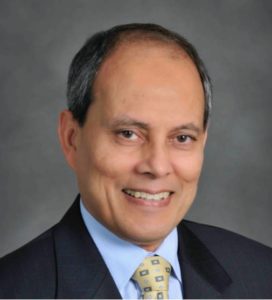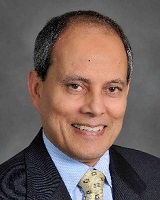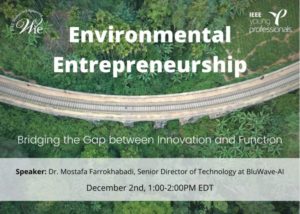Events
IEEE CANADA TECHNOLOGY LEADERSHIP WEBINAR SERIES – III
Speaker: Tom Coughlin of IEEE USA
Topic: IEEE-USA Supports Public Policy For A Better WorldÂ
IEEE-USA supports public policy and career and member services for IEEE members in the USA. This talk will include a brief discussion on what IEEE-USA does and will focus on its public policy activities to support future technologies, funding of science and technology, immigration policies that support a path to citizenship and support for engineers and technologists. I will also discuss the impact of the COVID-19 epidemic and what what IEEE and IEEE-USA is doing to help its members as well as society as a whole, to recover from this extraordinary event. This talk will include discussion of the future of work and the role of technology to enable remote work and new tools to work together in the real world even when we can’t be there physically.
Biography:
Tom Coughlin, President, Coughlin Associates is a digital storage analyst and business and technology consultant. He has over 39 years in the data storage industry with engineering and management positions at several companies. Coughlin Associates consults, publishes books and market and technology reports (including The Media and Entertainment Storage Report and an Emerging Memory Report), and puts on digital storage-oriented events. He is a regular storage and memory contributor for forbes.com and M&E organization websites. He is an IEEE Fellow, Past-President of IEEE-USA and is active with SNIA and SMPTE. For more information on Tom Coughlin and his publications and activities go to www.tomcoughlin.com.
Title: Josephson Arbitrary Waveform Synthesizer as a Quantum Standard of Voltage and Current Harmonics
Speaker: Dr. Dimitrios Georgakopoulos, Senior Research Scientist, National Measurement Institute, Sydney, Australia
Date/Time:Â Thursday, July 09, 2020, 6:30 pm – 7:30 p.m. EDT
Abstract: Josephson arbitrary waveform synthesizers (JAWS) are becoming a viable technology for national metrology institutes and industry to establish quantum standards of direct and alternating voltage. At the National Measurement Institute of Australia (NMIA) we have extended the application of the JAWS to provide a standard of both the magnitude and the phase of harmonics in a distorted waveform. Harmonic analysis is critical in a number of industrial applications such as electric power systems, power electronics, characterization of systems and materials and acoustics and vibration. At present, in the calibrations of power analyzers, the traceability of the magnitude of the harmonics is based on ac-dc transfer measurements. However, there is a gap in the traceability of the phase of the harmonics relative to the fundamental. The NMIA calibration system uses a JAWS chip from the National Institute of Standards and Technology (NIST), USA, a precision inductive voltage divider and a set of current shunts designed and manufactured by NMIA. For distorted waveforms with harmonic magnitudes from 5% to 40% of the fundamental, the calibration system can measure odd harmonics up to the 39th with magnitude uncertainties better than 0.001 % of the fundamental for voltage (from 0.01 V to 240 V) and current (from 0.005 A to 20 A) waveforms. The best phase uncertainties range from 0.001° to 0.010° (k = 2.0), depending on the harmonic number and harmonic magnitude. We anticipate that the ability of the JAWS to generate distorted waveforms with the lowest possible uncertainty in the magnitude, and phase spectra will make it a unique tool for low-frequency spectrum analysis.
Speaker’s Bio: Dimitrios Georgakopoulos (IEEE AM’11–M’12–SM’12) was born in Athens, Greece, in 1972. He received his B.Eng. degree in electrical engineering from the Technological Educational Institution of Piraeus, Egaleo, Greece, in 1996; his M.Sc. degree in electronic instrumentation systems from the University of Manchester, Manchester, UK, in 1999; and Ph.D. in electrical engineering and electronics from the University of Manchester Institute of Science and Technology, Manchester, UK, in 2002. From 2002 to 2007, he worked as a research scientist at the National Physical Laboratory, UK. In 2007, he joined the National Measurement Institute, Australia, as a research scientist, where he has been working on the development of quantum voltage standards and low frequency electromagnetic compatibility (EMC) standards. Dr Georgakopoulos is an Associate Editor of the IEEE Transactions on Instrumentation and Measurement, member of the IEEE IMS Measurements in Power Systems Committee (TC‑39), member of the NATA Accreditation Advisory Committee for Calibrations, and member of the American Association for the Advancement of Science (AAAS), USA.
Admission: Free, but registration is required at https://events.vtools.ieee.

Webinar: Role of the Smart Grid in Facilitating the Integration of Renewables
Speaker: Prof. Dr. Saifur Rahman, Director, Virginia Tech Advanced Research Institute, USA, IEEE Power & Energy Society (PES) President 2018-2019, IEEE PES Distinguished Lecturer
Date/Time: Tuesday, July 28, 2020, 6:30 pm – 7:30 p.m. EDT
Admission: Free, but registration is required: https://events.vtools.ieee.org/m/234594
For more details, please visit: https://www.ewh.ieee.org/soc/pes/ottawa
Abstract – With the focus on environmental sustainability and energy security, power system planners are looking at renewable energy as supplements and alternatives. But such generation sources have their own challenges – primarily intermittency. It is expected that the smart grid – due to its inherent communication, sensing and control capabilities – will have the ability to manage the load, storage and generation assets (including renewables) in the power grid to enable a large-scale integration of distributed generation. In a smart grid, information about the state of the grid and its components can be exchanged quickly over long distances and complex networks. It will therefore be possible to have the integration of sustainable energy sources, such as wind, solar, off-shore electricity, etc. for smoother system operation. But in order for this to be possible, the electric utility will have to evolve, and change their ways of operation to become an intelligent provider of these services. This lecture introduces the operational characteristics of renewable energy sources, and various aspects of the smart grid – technology, standards and regulations. It also addresses the interplay among distributed generation, storage and conventional generation to provide an efficient operational strategy in the context of the smart grid.

ADMISSION: Free, but the registration in advance is required.
REGISTRATION:Â https://events.vtools.ieee.org/m/236964.
Abstract – A smart city relies on widely distributed smart devices to monitor the urban environment in real-time, collects information for intelligent decision making, and facilitates various services to improve the quality of urban living. The distributed network of intelligent sensor nodes, as well as data centers/clouds where sensor data are stored and shared, constitutes a smart city infrastructure. Smart cities address urban challenges such as pollution, energy efficiency, security, parking, traffic, transportation, and others by utilizing advanced technologies in data gathering and communications interconnectivity via the Internet. It provides real time and remote monitoring for different aspects of data management in areas such as transportation, communication, video surveillance, and sensors distributed throughout the city. Simultaneously, the Smart City building blocks like education, telemedicine, health care, IT applications, pollution management, etc. can be deployed in the IEEE Smart Village initiative to have a greater impact on the rural population throughout the world. through reliable electricity and internet connectivity.
Speaker Bio – Prof. Dr. Saifur Rahman is the founding director of the Advanced Research Institute (www.ari.vt.edu) at Virginia Tech, USA, where he is the Joseph R. Loring Professor of Electrical and Computer Engineering. He also directs the Center for Energy and the Global Environment (www.ceage.vt.edu). He is a Life Fellow of the IEEE and an IEEE Millennium Medal winner. He was the founding Editor-in-Chief of the IEEE Electrification Magazine and the IEEE Transactions on Sustainable Energy. In 2006, he served on the IEEE Board of Directors as the Vice President for Publications. He is a Distinguished Lecturer for the IEEE Power & Energy Society (PES) and has lectured on renewable energy, energy efficiency, smart grid, electric power system operation and planning, etc. in over 30 countries. He was IEEE Power and Energy Society President 2018-2019 and is now a candidate for IEEE President-Elect 2021.
He chaired the US National Science Foundation Advisory Committee for International Science and Engineering, 2010-2013. He conducted several energy efficiency projects for Duke Energy, Tokyo Electric Power Company, US National Science Foundation, US Department of Defense, State of Virginia and US Department of Energy.
For any additional information, please contact: ajit.pardasani@ieee.org or branislav@ieee.org

About this Event
Environmental Entrepreneurship: Bridging Gap between Innovation and Function
Abstract:
Environmental challenges of the current century are systemic threats
to the fabric of our civilization. In this context, environmental
entrepreneurship has emerged as a key mitigation concept that combines
economic and environmental dimensions by leveraging state-of-the-art
technology innovations. Seeing entrepreneurship through the lens of
engineering innovation is crucial to produce actionable theory for
sustainable technology. But what are the environmental entrepreneurship
elements, challenges, and success factors? How can researchers,
technology innovators, and entrepreneurs connect to this emerging field?
This seminar introduces environmental entrepreneurship as the process
of discovering, evaluating, and exploiting market forces that allow to
have effective and fast business cases in environmentally-relevant
markets. The seminar will also discuss views on bridging academic
innovation and technology productization to deliver pragmatic solutions
to environmental challenges of the planet.
Speaker Biography
Dr. Mostafa Farrokhabadi is the Senior Director of Technology at
BluWave-ai, an internationally award-winning startup offering
data-driven control and optimization solutions for smart grids. He has
10 years of experience in designing mission-critical grid solutions for
industry and academia, including technical leadership of a $6M
international consortium in Electric Grid Modernization, and Smart Grid
projects with Hatch and Canadian Solar. Mostafa has authored/co-authored
several high-impact technical papers and patents on intelligent control
and optimization of renewable-penetrated grids. Mostafa obtained his
Ph.D. in Electrical and Computer Engineering from the University of
Waterloo. He has also studied and performed research in Sweden at KTH
and Germany at KIT. Mostafa has received multiple business, research,
and teaching awards, including the prestigious University of Waterloo
Doctoral Thesis Completion Award and Ottawa’s Forty Under 40. Currently,
he serves as an Associate Editor of the IEEE Transactions on Smart Grid
and IEEE DataPort, and Secretary of IEEE Ottawa Section.

